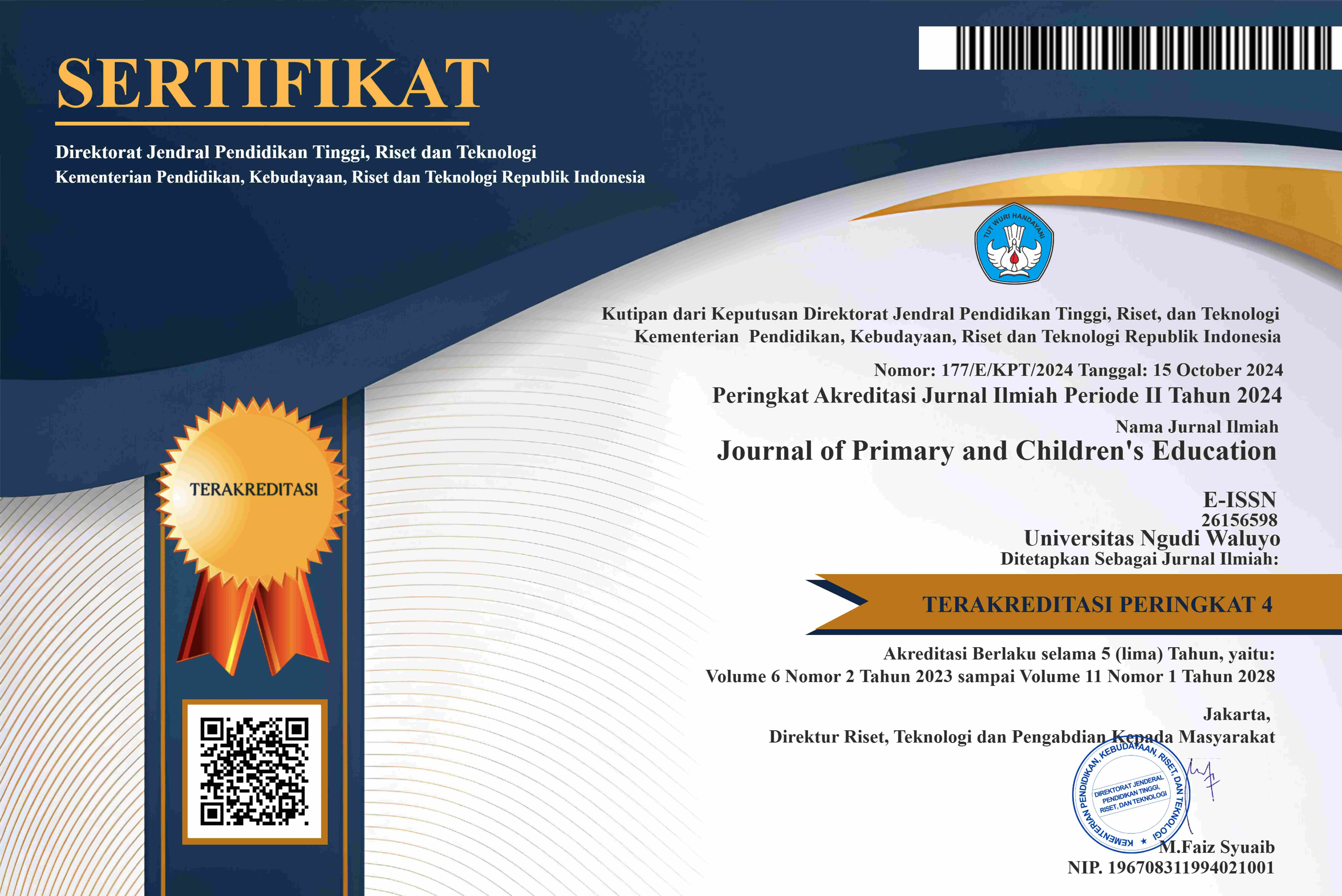Analisis Penilaian Berorientasi Higher Order Thinking Skills siswa Kelas V
DOI:
https://doi.org/10.35473/jnctt.v2i2.259Abstract
The purpose of this study was to investigate the implementation of Higher Order Thinking Skills (HOTS) oriented assessments on the 1st theme at 1st semester of Natural Sciences (IPA) grade V students at Candi 01 Semarang Elemntary School. This research is a qualitative research with data analysis steps including data reduction, data presentation and conclusion drawing. The data presentation in this research is a descriptive text artist. The results showed that Candi 01 Semarang Elementary School had carried out the assessment in class V well according to Permendikbud No. 23 of 2016. This is evidenced by the results of the analysis that show that the questions used in daily assessment, midterm assessment and final semester assessment meet almost all assessment criteria in every aspect, but the questions used are not all included in the HOTS question category because there are questions that only measure low-level cognitive levels. The assessment carried out has fulfilled all stages starting from planning the assessment, developing the assessment instruments, carrying out the appraisal, utilizing the results of the appraisal and reporting the results of the evaluation in the form of numbers 1-100 and description.
References
Arikunto, Suharsini. 2010. Prosedur Penelitian Suatu Pendekatan Praktik. Jakarta: PT Rineka Cipta.
Lestari, Anggi, dkk. Pengembangan Soal Tes Berbasis HOTS pada Model Pembelajaran Latihan Penelitian di Sekolah Dasar. http://ejournal.upi.edu/index.php/pedadidaktika/article/view/4801. Pedadidaktika : Jurnal Ilmiah Mahasiswa Pendidikan Guru Sekolah Dasar (3) (Diakses pada 2 April 2019).
Moleong, Lexy J. 2014. Metodologi Penelitian Kualitatif. Bandung: PT Remaja Rosdakarya
Mulyasa. 2013. Pengembangan dan Implementasi Kurikulum 2013. Bandung: PT Remaja Rosdakarya.
Peraturan Kementrian Pendidikan dan Kebudayaan Nomor 54. 2013. Standar Kompetensi Lulusan Pendidikan Dasar dan Menengah. http://bsnp-indonesia.org/ (Selasa, 12 maret 2019).
Sani, Ridwan Abdullah. 2019. Pembelajaran Berbasis HOTS (Higher Order Thinking Skills). Tangerang: Tira Smart.
Sugiyono. 2017. Metode Penelitian Pendidikan (Pendektan Kuantitatif, Kualitatif, dan R&D). Bandung: Alfabeta.
Sunarti dan Selly Rahmawati. 2014. Penilaian Kurikulum 2013-Membantu Guru dan Calon Guru Mengetahui Langkah-Langkah Penilaian Pembelajaran. Yogyakarta: ANDI.
Takari, Enjah. 2010. Model Pembelajaran Kooperatif Ilmu Pengetahuan Alam 2. Bandung: Genesindo.
Uno, Hamzah B. dan Satria Koni. 2013. Assessment Pembelajaran: Salah Satu Bagian Penting dari Pelaksanaan Pembelajaran yang Tidak Dapat Diabaikan Adalah Pelaksanaan Penilaian. Jakarta: Bumi Aksara.
Wijayanti, Arfilia dan Qoriati Mushafanah. 2017. Higher Order Thinking Skills (HOTS) Berbasis Authentic Task untuk Meningkatkan Keterampilan Proses Sains Mahasiswa Calon Guru Sekolah Dasar. Prosiding UPGRIS Tahun 2017,3.
Yuniar, Maharani, dkk. 2015. Analisis HOTS (High Order Thinking Skills) pada Soal Objektif Tes dalam Mata Pelajaran Ilmu Pengetahuan Sosial (IPS) Kelas V SD Negeri 7 Ciamis. http://ejournal.upi.edu/index.php/pedadidaktika/article/view/5845/3961. Pedadidaktika : Jurnal Ilmiah Mahasiswa Pendidikan Guru Sekolah Dasar (2) (Diakses pada 2 April 2019).
Published
How to Cite
Issue
Section
License
Copyright notice:
- Authors retain copyright and grant the journal right of first publication with the work simultaneously licensed under Creative Commons Attribution License that allows others to share the work with an acknowledgement of the work's authorship and initial publication in this journal.
- Authors are able to enter into separate, additional contractual arrangements for the non-exclusive distribution of the journal's published version of the work (e.g., post it to an institutional repository or publish it in a book), with an acknowledgement of its initial publication in this journal.
- Authors are permitted and encouraged to post their work online (e.g., in institutional repositories or on their website) prior to and during the submission process, as it can lead to productive exchanges, as well as earlier and greater citation of published work (The Effect of Open Access)







